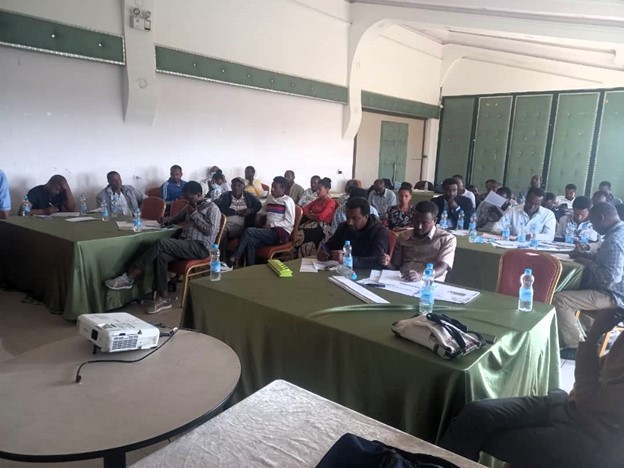
Photo caption: WPdx training delivered by MWA to government stakeholder and Sustainable WASH Program implementation partners in March 2023. Photo credit: Selamawit Tiruneh
Over the course of three years, starting in 2020, the Water Point Data Exchange (WPdx) partnered with the Millennium Water Alliance (MWA) in collaboration with the Sustainable WASH Program in Ethiopia to support improved decision making for the rural water sector in the Amhara Region. Highlights from this journey have been shared by the MWA Ethiopia team in three blog posts available on the WPdx News site:
- Validating the Impact: A Field Visit Assessment of WPdx Rural Decision Support Tools in Ethiopia
- Utilizing WPdx in the Amhara Region of Ethiopia
- Increasing water point data sharing for evidence-based decision making in Ethiopia: The start of a journey
In addition to these posts, MWA prepared two case study documents described briefly below and available at the provided links:
Using WPdx for Decision-Making in Water Point Implementation in Ethiopia
- Describes how the Millennium Water Alliance (MWA) applied WPdx to conduct a service gap identification analysis in three woredas (districts) in the Amhara
region, as part of the Sustainable WASH Program (SWP) funded by the Conrad
N. Hilton Foundation. - Highlights the benefits and challenges of using WPdx and its decision support tools, such as measuring water access, prioritizing locations for rehabilitation
and new construction, and predicting water point status. - Concludes that WPdx has the potential to transform the decision-making process in the water sector, by providing evidence-based insights, improving resource
allocation, enhancing service delivery, and increasing accountability. The post includes recommendations about how to address issues such as data quality,
reliability, privacy, usability, and collaboration to fully realize the potential of WPdx.
The Case for a Private Instance of WPdx in Ethiopia
- Discusses the challenges and opportunities of water point data management in
Ethiopia, where access to safe and sustainable water services is low, especially in rural areas. - Highlights the benefits of implementing a private instance of WPdx in Ethiopia, which would address the concerns about data privacy, reliability, and accountability. It would also allow for customization based on Ethiopia’s specific needs and parameters.
- Concludes that a private instance of WPdx would empower the government and
stakeholders to make evidence-based decisions, allocate resources effectively, and improve water service delivery in rural Ethiopia.
Acknowledgement: Funding for the work discussed in the post was generously provided by the Conrad N. Hilton Foundation.
